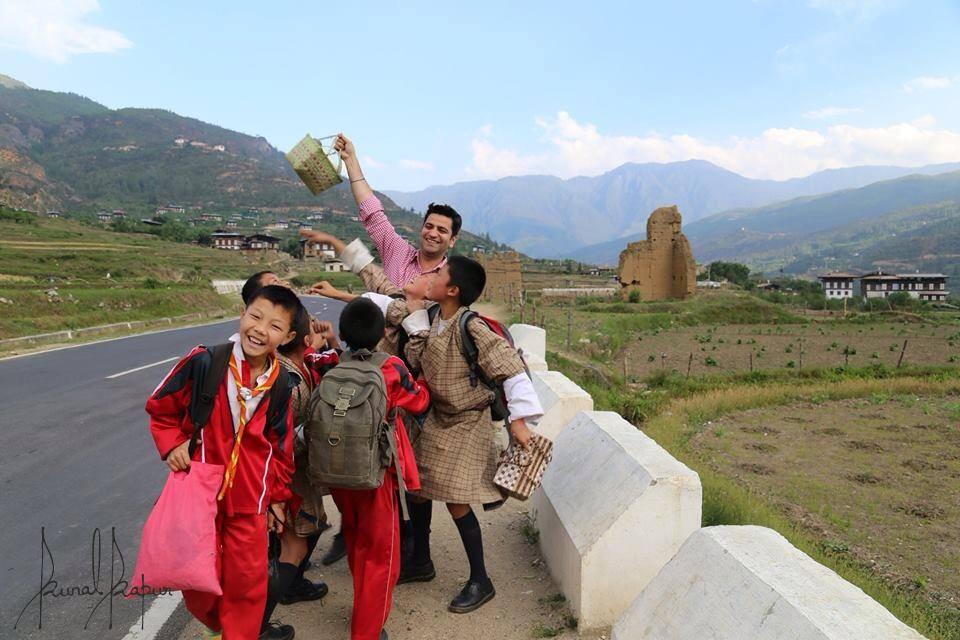Bhutan

This was my very frist trip to Bhutan and am sure wont be the last. I never really planned for a visit to Bhutan and frankly not many in In
dia really plan to visit there, not the ones I know for sure. But when I had this opportunity to talk and present my debut cookbook “A chef in every home” at the Mountain Echos, India Bhutan Literary Fest 2014 I could’nt say no. I had a fair idea about where the country is but I had to look up on google to find out where exactly it is. This beautiful country is towards the eastern himalayan belt with Tibet in the north and rest all covered by India with a close proximity to china..jpg)
Thinking that with such neighbouring countries the people, cuisine, place and culture will be quite predictable
 and similar. I like to travel and it would be great to visit the festival and the country and with this on mind I packed my luggage for 3 days. Druk airways the national carrier was comfortable andmeals on board were nice and warm. Minutes before the arrival at the Paro international airport the scenic beauty was mesmerising. Across the clear sky you could look at the mighty Himalayas with gleaming ice. It was a sight I had never seen before and I could not lift off my eyes.
and similar. I like to travel and it would be great to visit the festival and the country and with this on mind I packed my luggage for 3 days. Druk airways the national carrier was comfortable andmeals on board were nice and warm. Minutes before the arrival at the Paro international airport the scenic beauty was mesmerising. Across the clear sky you could look at the mighty Himalayas with gleaming ice. It was a sight I had never seen before and I could not lift off my eyes.
First step out of the plane and I could feel the change in the air, fresh, cold and energizing. Paro international airport (the only international airport in the country) is very quite, almost no announcements, no flashy stores, no fancy eatery which was rather amusing because I am used to seeing the hustle bustle and chaos in an airport. My brain had difficulty adapting to such silence which other wise is constantly looking for simulation. It took a while for the adjustment but I felt so much at peace, right then I knew this place was different
The drive from paro to Thimphu (capital and largest city) takes about an hour through scenic views of the valley. Roads are superb compared to bumpy joy rides in India that I am used to. Half way through the journey I look out of the window of the car I see open blue sky, green hills, long stretches of roads, people walking, fewer cars, smiling faces, infants tied to the back of the mothers, rice fields, simple houses, nothing looks fancy and no one is out there in a hurry. I had to stop the car at a

beautiful spot to soak up a little of Bhutan in me. As I sat on the milestone I met a gang of young kids walking back from school. Thanks to Masterchef India a lot of Bhutanese people watch the show and getting recognised by the kids was easy. The boys shared a lot about the place, told me places to visit, things to do and what to eat in Bhutan. I must have spent some odd 30 mins with them that were full of silly jokes, sharing and playing: All of it that I used to do as a kid.

 For any chef the best investment is to travel. And now that I was in Bhutan I took keen interest to discover the local cuisine, understand the culture and the arts. So next day early morning I set out to the market. As I walked through the market I found out that almost everyone I saw was wearing their national dress a “Kira” for Women and “Gho” for men. I mean difficult to spot someone in jeans and trousers. Also what was amazing is the besutiful display of colour and art on each and every house, shop or market that I went to. There is a sense of art and colours that flows into the clothes they wear and the houses they live in. Beautifully hand painted corridors, windowpanes and doors looked magical. Colourful cloths printed with prayers hang at every nook and corner and every road and hilltop. What I was again happy to experience is that people are calm and friendly No honking on the roads, no rush rush, no people trying to push things on you as a tourist. People don’t have plenty but are smiling and no one in a hurry to reach somewhere. Good part is the roads are kept clean, no litter and people keeping their place clean themselves. This just reminded of what the queen mother said about how much Bhutanese people cared for their surroundings. All that speech started to make sense to me. Bhutan is not a developed country nor is a very rich state but the people are the biggest assest because they care about their home and that is what matters. I am sure we in India can learn a lot form this small country.After a long walk back to the hotel I decided to visit some place important in Thimphu. My driver instantly drove us to bhuddha point. It is one of the worlds largest statues of a sitting Buddha on top of a hill. The climb was easy and the view was awesome. The golden coloured 169 feet tall statue on
For any chef the best investment is to travel. And now that I was in Bhutan I took keen interest to discover the local cuisine, understand the culture and the arts. So next day early morning I set out to the market. As I walked through the market I found out that almost everyone I saw was wearing their national dress a “Kira” for Women and “Gho” for men. I mean difficult to spot someone in jeans and trousers. Also what was amazing is the besutiful display of colour and art on each and every house, shop or market that I went to. There is a sense of art and colours that flows into the clothes they wear and the houses they live in. Beautifully hand painted corridors, windowpanes and doors looked magical. Colourful cloths printed with prayers hang at every nook and corner and every road and hilltop. What I was again happy to experience is that people are calm and friendly No honking on the roads, no rush rush, no people trying to push things on you as a tourist. People don’t have plenty but are smiling and no one in a hurry to reach somewhere. Good part is the roads are kept clean, no litter and people keeping their place clean themselves. This just reminded of what the queen mother said about how much Bhutanese people cared for their surroundings. All that speech started to make sense to me. Bhutan is not a developed country nor is a very rich state but the people are the biggest assest because they care about their home and that is what matters. I am sure we in India can learn a lot form this small country.After a long walk back to the hotel I decided to visit some place important in Thimphu. My driver instantly drove us to bhuddha point. It is one of the worlds largest statues of a sitting Buddha on top of a hill. The climb was easy and the view was awesome. The golden coloured 169 feet tall statue on.JPG)




